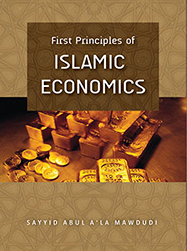First Principles of Islamic Economics
Material type: TextLanguage: English Publication details: Islamabad : IPS Press Institute of Policy Studies, c2013Description: xliv, 290 : illISBN:
TextLanguage: English Publication details: Islamabad : IPS Press Institute of Policy Studies, c2013Description: xliv, 290 : illISBN: - 9789694481753
- 297.273 MAW
| Item type | Current library | Shelving location | Call number | Copy number | Status | Date due | Barcode |
|---|---|---|---|---|---|---|---|
 Lending Collection
Lending Collection
|
Circulation Section | Circulation Section | 297.273 MAW | 2023-2024 | Available | 98575 | |
 Lending Collection
Lending Collection
|
Circulation Section | Circulation Section | 297.273 MAW | 2023-2024 | Available | 98576 |
ABOUT THE AUTHOR
Abul A’la Mawdudi (1903-1979) was a leading Muslim intellectual and a chief architect of the Islamic revival in the twentieth century. He authored more than a hundred works on Islam, both popular and scholarly, and his writings have been translated into some forty languages.
2nd Imprint Paperback 2019
SUMMARY
Drawing upon Islamic sources, the study spells out a new paradigm for economic analysis and policy, wherein economic pursuits take place in the context of moral values and are directed towards the achievement of personal and social objectives. Integral to this approach is the concept of an interest-free economy that attempts to make efficiency and equity inseparable and interdependent. The creation and distribution of wealth thus become instrumental in promoting individual and social well-being, opening up pathways to development, social justice, and human welfare. This comprehensive anthology collects all of his major writings and provides a historic as well as an essential introduction to Islamic economics.
